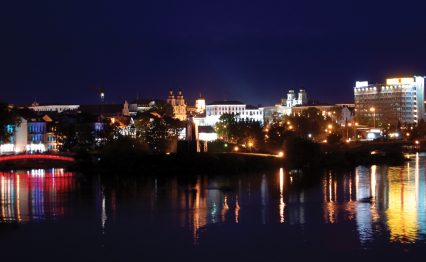
Russia’s accession to the WTO in August this year spells trouble for Belarus, whose already strained economy depends heavily on Russian trade. Laura Benitez reports.
In August this year, Russia finally became a member of the World Trade Organisation (WTO), entitling it to cheaper tariff rates on both its exports and imports, and an easier and more open trade relationship with other WTO countries.
But Russia’s gain is Belarus’s loss. One third of Belarus’s exports head to Russia, which under the new discounted tariff rates will be looking elsewhere for its goods; projections show that Russia is estimated to increase its imports from the EU by €3.9bn a year. This places Belarus in a vulnerable position, as such a loss to its export market share will turn the country into an import-led nation.
However, there are some positives. Belarus’s Customs Union agreement − signed with Russia and Kazakhstan in January 2010 − could be the country’s saving grace, at least for the moment. On agreeing the terms of its WTO entry, Russia ensured the existing Customs Union agreement, which removes all customs borders between the three countries, will continue to be honoured. Belarus will therefore become eligible for reduced rates on its import tariffs from all WTO countries.
Irina Lepeshko, head of financial institutions at Minsk-based Alfa-Bank says: “We are going to be a so-called half-member of the WTO. The Belarusian economy will become open for imported goods and services at tariffs agreed upon by Russia with WTO members, for many items that are supposed to be lower than the level of import tariffs existing within the Customs Union.”
Another factor playing in Belarus’s favour is that the effects of Russia’s WTO accession will not be heavily felt in the short term – the transition period begins in 2015 and ends in 2020 − giving the government a little time to mull over its options on how it can compete in this new space.
Serge Nizkov from the settlement department at Minsk Transit Bank (MT Bank) comments: “Generally Russia’s access to the WTO will not have a serious impact on trade activities in Belarus in the short term. But the long-term forecast is rather negative due to the future reduction of customs duties by Russia, which are also binding for all participants of the Customs Union. Some of the goods, such as tractors, agricultural machines, trucks, meat and milk products, will become particularly vulnerable.”
As time ticks on and Russia begins to reap the benefits of cheaper imports and easier global trade access, Belarus could fall into serious danger. Especially because the Customs Union rules will not grant Belarus the WTO’s competitive advantages of reduced export duties. Adding insult to injury, Kazakhstan is set to join the WTO next year, making Belarus the only member of the Customs Union to be excluded from WTO perks.
According to data from Minsk-based economic research group IPM Research Centre, the first sectors to suffer from dwindling exports will be refrigerator and truck production, agricultural machinery, pharmaceuticals, TV sets and packaging.
Nizkov believes that as well as losing a competitive advantage over its exports, the lack of membership will also further hamper Belarus’s chances of attracting foreign direct investment, as it will not continue to not be covered by WTO legislations which make it easier to settle trade disputes, should they arise.
Tricky trade ties
Dwindling export market share and increasing competition is not all Belarus has to worry about. Russia’s WTO accession will mean it will have to cut a lot of its subsidies to Belarus, including those on its energy supplies, which not only help to meet Belarus’s own energy needs but serves as its main export commodity.
“Production costs for Belarusian manufacturers will increase as Russia raises domestic energy prices. Without these explicit or implicit subsidies, Belarusian businesses may find it harder to compete with foreign imports from third countries. It’s important therefore that Belarus implements structural reforms to put its economy on a stronger footing before these protectionist measures are dismantled in line with WTO requirements,” says Francis Delaey, head of the EBRD’s resident office in Minsk.
These upcoming developments should act as a warning to Belarus, which should be attempting to keep Russia as its closest political ally. Instead however, Belarus seems to be antagonising its already volatile relationship with its closest neighbour after it was recently caught cheating Russia out of US$1bn in tax customs.
Russia does not charge Kazakhstan and Belarus duties for exports of crude oil because of it Customs Union pact, however if the countries decide to refine and re-export Russia’s oil and gas, both countries are expected to pay hefty export duties. In September this year, Belarus was exposed in a scam which saw it mis-labelling its gas and oil exports as solvents and thinners, which incur lower customs duties compared to that of refined oil and gas.
Belarus is playing a dangerous game; not only does Russia have a 30% claim on its exports and feed in its energy supplies, but it also acts as its biggest lender. Last year Russia bailed out Belarus with a US$5bn financing package in return for a stake in one of its state-owned gas pipelines. This year it is awaiting another US$440mn from Russia in exchange for further state assets.
It is clear that Belarus cannot afford to be taking chances when it comes to keeping Russia on its side, especially as its financial dependency on its neighbour is expected to remain strong in the short term.
MT Bank’s Nizkov explains that historically, as a heritage of the former Soviet Union, Belarus has several large industries which contribute to its economy, including Minsk’s tractors plant, its motor and trucks plant, the Belarusian steel company, and oil processing plants among others.
“But these entities are strongly dependent on natural resources such as oil, gas and steel. As for now there are no other suppliers of commodities other than Russia in the region and the possibility to diversify the risks and the suppliers still remains unconscious, so trade ties between Russia and Belarus will have to stay strong,” Nizkov adds.
Structural reforms
For Belarus to be considered as a serious contender in global trade and to become more independent as an exporting country the government will have to speed up its WTO membership, which is planned for 2014. However, this date is becoming more and more unlikely due to growing political tensions. So until the agreements edge closer, Belarus will have to implement structural reforms and diversify its trade alliances to keep its economy afloat.
According to the EBRD’s Delaey, there are numerous steps that Belarus needs to take in order to safeguard itself against the growing competitive environment.
“Belarus should accelerate the pace of structural reforms. The Presidential Directive No. 4 initiative outlined an ambitious reform programme that aims to support private sector development by liberalising the economy, improving the business climate and strengthening competition. Following an initial wave of reforms in 2010 that led to an improvement in the ‘World Bank’s Doing Business’ rating for Belarus, momentum was lost during the balance of payment crisis of 2011,” he says.
It is also vital for Belarus to begin strengthening its trade relations with other countries, preferably outside the Countries of Independent State (CIS) region – which currently accounts for two-thirds of its non-energy exports. This is compounded by the fact that Belarus’ non-energy exports focus mainly on agricultural produce and low-value added machinery and vehicles which, according to Delaey, cannot compete with Russian or cheaper Chinese products.
Industry players also believe that measures must be taken to modernise Belarus’s manufacturing equipment, with a particular priority given to restructuring the most vulnerable sectors, such as heavy trucks production and agricultural machine manufacturing – which together account for 20% of Belarusian exports.
Nizkov states: “To succeed, producers should invest more in modernisation and marketing. Boosting exports is impossible without developing and implementing new technologies. I believe that the most significant sectors of the economy will be forced by the government to become more competitive and cope with the new challenge.”
However, he stresses that in order to compete with international producers in terms of quality and price, state grants will have to be used to remodel enterprises, instead of simply funding basic maintenance work.
WTO’s political fence
Regardless of how many reforms the Belarusian government makes, there is no question about how urgently Belarus needs to speed up its WTO membership. The transition period will give the country time to make the necessary reforms for its sectors to become competitive, but it will also allow the government to begin making headway in its WTO case.
“Belarus applied for WTO membership in September 1993 but progress has been slow. Following Russia’s WTO accession, Belarus should redouble its accession efforts. Membership would not only increase Belarus’s access to WTO members’ markets but also reduce the regulatory burden, attract FDI and facilitate incorporation into regional value chains. “When Belarus will be able to join is largely a function of how fast it can progress in its bilateral negotiations with WTO member states,” Delaey at EBRD notes.
Alfa-Bank’s Lepeshko adds: “Belarus is still working through the Draft Working Party Report preparation. The last formal meeting of the Working Group in Belarus was in 2004 and after that the consultations have been unofficial. However, the process is still quite active, despite certain stumbling issues.”
Belarus has many political hurdles which stand in the way of its WTO membership, and although the original timeframe for the country’s accession was 2014, a recent statement by Belarus’s president Alexander Lukashenko suggests that this target date is hopeful at the best.
In an interview to Mir Television and Radio Company of the CIS on October 4, Lukashenko claimed that that the European Union and the US are hampering its chances of accession.
“They tell us it is a purely commercial and economic organisation. Not at all; it is dominated by politics. The European Union and the United States built that political fence for well-known reasons: they allege we ‘do not observe human rights’, we are ‘the last stronghold of dictatorship’ and so on.”
One thing is certain, Belarus cannot lean on Russia’s WTO member status for too long, and so it is now all down to the Belarusian government to speed up its negotiations. “We cannot isolate ourselves from the world as our economy is export-centred,” Lukashenko said in his speech. “We will have to join the WTO sooner or later.”











